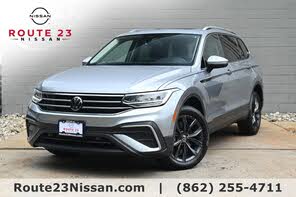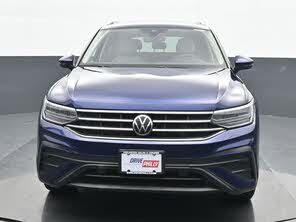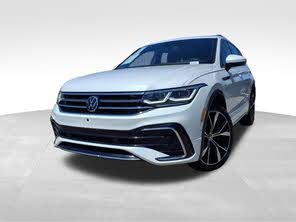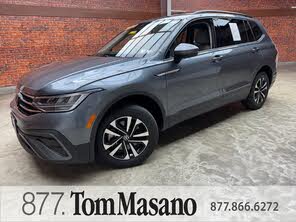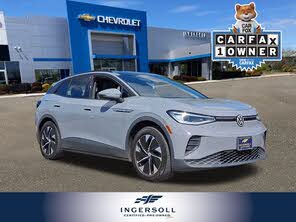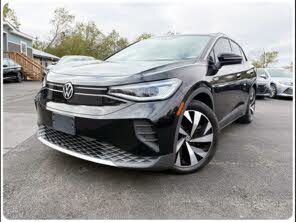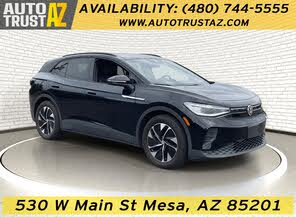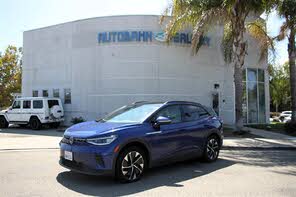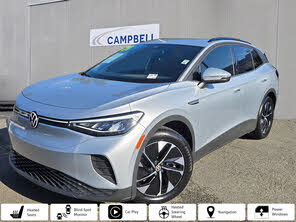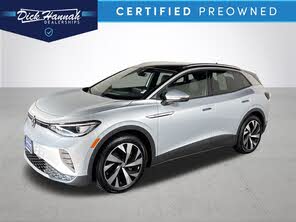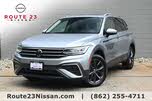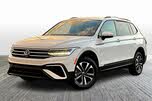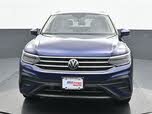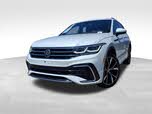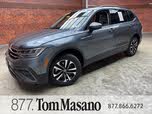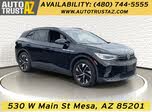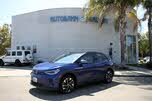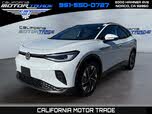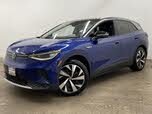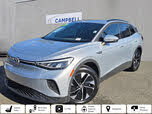2022 Volkswagen Tiguan vs 2021 Volkswagen ID.4
Overview | |
MSRP$26,490 | MSRP$39,995 |
Listings2899 | Listings395 |
Ratings & Reviews | |
User Reviews | User Reviews |
Expert reviews7.7 out of 10 | Expert reviews7.3 out of 10 |
Pros
Cons
| Pros
Cons
|
2022 Volkswagen Tiguan Reviews SummaryVolkswagen’s most popular model is the Tiguan compact SUV, representing quite a turn of events compared to 2017, when the original version languished at or near the bottom of consumer consideration lists. What happened? Compact crossover SUV sales exploded like a California wildfire during a Santa Ana wind event, and the second-generation Tiguan grew in size to become one of the biggest of the traditional small SUVs. Unsurprisingly, with the updated 2022 Volkswagen Tiguan, the automaker elects to hone instead of change this recipe for success. | |
2021 Volkswagen ID.4 Reviews SummaryThe “Dieselgate” emissions scandal forced Volkswagen to double down on electric cars, and now we’re finally seeing the first result of that: the 2021 Volkswagen ID.4 electric crossover. VW has made an electric car before, but its last attempt, the e-Golf, was built to satisfy emissions standards, not rack up sales. It was barely advertised, and it was sold only in certain states. That’s not the case with the ID.4, which will be available nationwide and will even be built in Tennessee starting in 2022. Volkswagen views the ID.4 as a rival not to other EVs, but to mainstream gasoline vehicles like the Honda CR-V and Toyota RAV4. Being late to the party means there are already several other EVs trying to coax new-car buyers away from internal combustion, however. If you want a reasonably-priced EV, the Nissan Leaf, Hyundai Kona Electric, and Kia Niro EV already exist, and General Motors just announced the 2022 Chevrolet Bolt EUV—a new variant of the Chevy Bolt EV with a crossover body style similar to the Volkswagen. We tested an ID.4 1st Edition, which commemorates the car’s launch, and an ID.4 PRO S with all-wheel drive (AWD). The 1st Edition is a limited-edition model that has already sold out, but it’s mechanically identical to the ID.4 Pro S AWD, albeit with power sent only to the rear wheels. | |
No video found | |
Popular Features & Specs | |
Engine2.0L 184 hp I4 | Engine201 hp Electric |
Drive TrainFWD | Drive TrainRWD |
Seating Capacity7 | Seating Capacity5 |
Horsepower184 hp @ 6000 rpm | Horsepower |
EV Battery Capacity | EV Battery Capacity82 kWh |
MPG City23 | MPG City104 |
MPG Highway30 | MPG Highway89 |
Battery Charge Time (240V) | Battery Charge Time (240V)8 hours |
Engine | |
Engine Name2.0L 184 hp I4 | Engine Name201 hp Electric |
Torque221 lb-ft @ 1900 rpm | Torque |
Horsepower184 hp @ 6000 rpm | Horsepower |
Battery Charge Time (240V) | Battery Charge Time (240V)8 hours |
DrivetrainFWD | DrivetrainRWD |
Fuel Economy | |
EV Battery Capacity | EV Battery Capacity82 kWh |
MPG City23 | MPG City104 |
MPG Highway30 | MPG Highway89 |
Interior | |
Seating Capacity7 | Seating Capacity5 |
Safety | |
Front Crash Overall | Front Crash Overall5 |
Side Crash Overall5 | Side Crash Overall5 |
Dimensions & Capacity | |
Cargo Space12.0 cu ft | Cargo Space30.3 cu ft |
Curb Weight3765 lbs | Curb Weight4517 lbs |
Height66.4 in | Height64.4 in |
Length186.1 in | Length180.5 in |
Width72.4 in | Width72.9 in |
Wheelbase109.9 in | Wheelbase108.9 in |
Maximum Payload1157 lbs | Maximum Payload1347 lbs |
Number of doors4 | Number of doors4 |
Maximum Towing Capacity1500 lbs | Maximum Towing Capacity |
Overview | ||
MSRP | $26,490 | $39,995 |
Listings | ||
Ratings & Reviews | ||
User reviews | ||
Expert reviews | 7.7 out of 10Read full review | 7.3 out of 10Read full review |
Pros & cons | Pros
Cons
| Pros
Cons
|
Summary | Volkswagen’s most popular model is the Tiguan compact SUV, representing quite a turn of events compared to 2017, when the original version languished at or near the bottom of consumer consideration lists. What happened? Compact crossover SUV sales exploded like a California wildfire during a Santa Ana wind event, and the second-generation Tiguan grew in size to become one of the biggest of the traditional small SUVs. Unsurprisingly, with the updated 2022 Volkswagen Tiguan, the automaker elects to hone instead of change this recipe for success. | The “Dieselgate” emissions scandal forced Volkswagen to double down on electric cars, and now we’re finally seeing the first result of that: the 2021 Volkswagen ID.4 electric crossover. VW has made an electric car before, but its last attempt, the e-Golf, was built to satisfy emissions standards, not rack up sales. It was barely advertised, and it was sold only in certain states. That’s not the case with the ID.4, which will be available nationwide and will even be built in Tennessee starting in 2022. Volkswagen views the ID.4 as a rival not to other EVs, but to mainstream gasoline vehicles like the Honda CR-V and Toyota RAV4. Being late to the party means there are already several other EVs trying to coax new-car buyers away from internal combustion, however. If you want a reasonably-priced EV, the Nissan Leaf, Hyundai Kona Electric, and Kia Niro EV already exist, and General Motors just announced the 2022 Chevrolet Bolt EUV—a new variant of the Chevy Bolt EV with a crossover body style similar to the Volkswagen. We tested an ID.4 1st Edition, which commemorates the car’s launch, and an ID.4 PRO S with all-wheel drive (AWD). The 1st Edition is a limited-edition model that has already sold out, but it’s mechanically identical to the ID.4 Pro S AWD, albeit with power sent only to the rear wheels. |
Video | No video found | |
Popular Features & Specs | ||
Engine | 2.0L 184 hp I4 | 201 hp Electric |
Drive Train | FWD | RWD |
Seating Capacity | 7 | 5 |
Horsepower | 184 hp @ 6000 rpm | |
EV Battery Capacity | 82 kWh | |
MPG City | 23 | 104 |
MPG Highway | 30 | 89 |
Battery Charge Time (240V) | 8 hours | |
Engine | ||
Engine Name | 2.0L 184 hp I4 | 201 hp Electric |
Torque | 221 lb-ft @ 1900 rpm | |
Horsepower | 184 hp @ 6000 rpm | |
Battery Charge Time (240V) | 8 hours | |
Drivetrain | FWD | RWD |
Fuel Economy | ||
EV Battery Capacity | 82 kWh | |
MPG City | 23 | 104 |
MPG Highway | 30 | 89 |
Interior | ||
Seating Capacity | 7 | 5 |
Safety | ||
Front Crash Overall | 5 | |
Side Crash Overall | 5 | 5 |
Dimensions & Capacity | ||
Cargo Space | 12.0 cu ft | 30.3 cu ft |
Curb Weight | 3765 lbs | 4517 lbs |
Height | 66.4 in | 64.4 in |
Length | 186.1 in | 180.5 in |
Width | 72.4 in | 72.9 in |
Wheelbase | 109.9 in | 108.9 in |
Maximum Payload | 1157 lbs | 1347 lbs |
Number of doors | 4 | 4 |
Maximum Towing Capacity | 1500 lbs | |
The 2022 Volkswagen Tiguan stood out among its competitors with a design that leaned towards conservatism, featuring a creased, folded, and symmetrical look. This approach, while not eliciting strong emotional responses, aged well and appealed to fans of simplicity and minimalism. The refreshed front styling aligned the Tiguan with Volkswagen’s larger Atlas models, showcasing a restyled grille with the new VW logo and an available illuminated grille bar. Standard LED headlights, new nameplate lettering on the rear liftgate, and redesigned aluminum wheels added to its updated appearance.
Volkswagen simplified the Tiguan lineup for 2022, offering it in S, SE, SE R-Line Black, and SEL R-Line trims with either front-wheel drive (FWD) or all-wheel drive (AWD). Prices ranged from $25,995 to $36,995, with a destination charge of $1,195. The SEL R-Line test vehicle, priced at $37,970 MSRP, featured a sportier look, especially in the SE R-Line Black trim with its trendy blacked-out appearance. The interior of the SEL R-Line boasted perforated and piped leather upholstery, new technology, touch-sensing controls, and ambient lighting with 15 color options, giving it an upscale feel despite some hard plastic elements.
The 2021 Volkswagen ID.4, designed from the ground up as an electric vehicle (EV), showcased a distinctive look that set it apart from its gasoline counterparts. It replaced the straight lines and sharp angles of models like the Tiguan and Atlas with a streamlined profile and wheels pushed out to the corners. The ID.4 was part of VW’s EV-specific MEB platform, following the European-market ID.3 hatchback. Volkswagen chose to bring the ID.4 to the U.S. market, recognizing the higher demand for crossovers over hatchbacks.
The ID.4’s interior combined Volkswagen’s minimalism with a smartphone aesthetic, featuring piano black and matte plastic elements. The base ID.4 Pro came with a leather-wrapped steering wheel and cloth seats, while the Pro S and 1St Edition models offered leatherette upholstery. Despite its streamlined design, the ID.4 didn’t quite look like an SUV, similar to other EV crossovers like the Chevy Bolt EUV and Hyundai Kona Electric. The interior felt spacious, with good forward visibility, although rearward visibility was hindered by thick rear pillars and a small back window. The ID.4 also lacked a “frunk,” opting instead to maximize cabin space.


















The 2022 Volkswagen Tiguan retained its turbocharged 2.0-liter four-cylinder engine, producing 184 horsepower at 6,000 rpm and 221 pound-feet of torque at 1,900 rpm. An eight-speed automatic transmission transferred power to the front wheels, with an optional 4Motion AWD system that could send up to half the power to the rear wheels when needed. The Tiguan offered Eco, Normal, Sport, and Individual driving modes, with additional Offroad settings for AWD models. Despite its 7.6 inches of ground clearance, the Tiguan was best suited for well-traveled paths.
The Tiguan’s MacPherson struts in front and multi-link independent rear suspension, along with variable assist steering, provided a nimble and responsive driving experience. However, the engine’s torque arrived later than some turbocharged engines, resulting in momentary turbo lag when accelerating from a stop. The EPA rated the R-Line with 4Motion at 24 mpg in combined driving, and our test drive in Malibu, California, averaged 24.7 mpg. While the Tiguan felt nimble in normal driving situations, it lacked the outright fun factor when pushed to its limits.
The 2021 Volkswagen ID.4 launched with a single rear-mounted electric motor, producing 201 horsepower and 229 pound-feet of torque, powered by an 82-kilowatt-hour battery pack. It was the first rear-wheel drive (RWD) Volkswagen passenger car sold in the U.S. since the Beetle. An all-wheel-drive (AWD) version, with a second electric motor powering the front wheels, arrived later in 2021, increasing power output to 295 horsepower and 339 pound-feet of torque.
RWD provided balanced handling, with the front wheels steering and the rear wheels driving. The electric motor’s instantaneous torque made acceleration from stoplights enjoyable. The AWD version offered additional power and traction, making it quick around town and capable of reaching highway speeds with ease. However, the ID.4 was tuned for comfort rather than sporty handling, with noticeable body roll in corners but a smooth ride over bumps. Unlike many EVs, the ID.4 did not offer aggressive regenerative braking for one-pedal driving, relying instead on friction brakes for a more familiar driving experience.
The 2022 Volkswagen Tiguan was spacious enough to be compared to smaller midsize SUVs, with a standard third-row seat in FWD models. The SEL R-Line test vehicle featured comfortable leather-wrapped front seats with eight-way power adjustment, heating, and ventilation. The second row was roomy and comfortable for adults, with rear air conditioning vents, a USB charging port, and ample storage. However, the switch to touch controls on the steering wheel and dashboard proved challenging to use.
Cargo space in the Tiguan was among the best in its class. FWD models with the third-row seat offered 12 cubic feet behind the third row, 33 cubic feet with the third row folded, and 65.5 cubic feet with the second row folded. The 4Motion model provided 37.6 cubic feet behind the back seat and 73.4 cubic feet with the rear seat folded, comparable to midsize SUVs.
The 2021 Volkswagen ID.4 offered more front and rear headroom than competitor EVs, although legroom was average for the segment. It provided 30.3 cubic feet of cargo space with the rear seats in place and 64.2 cubic feet with the rear seats folded, more than several EV competitors but less than the Honda CR-V and Toyota RAV4. The ID.4 lacked a “frunk,” opting to maximize cabin space instead. The interior felt spacious from the driver’s seat, with good forward visibility but substandard rearward visibility due to thick rear pillars and a small back window.
The ID.4 featured a unique twist-grip gear selector on the dashboard, freeing up space on the center console. However, the console itself was narrow and close to the floor, providing limited storage space for larger items. Heated steering wheel and front seats were standard, proving effective during cold weather testing, although the driver’s seat lacked thigh support.
The 2022 Volkswagen Tiguan came with standard digital instrumentation, with an 8-inch display in most versions and a 10.25-inch display in the SEL R-Line. The MIB3 infotainment system, introduced last year, carried over in all but the base Tiguan S, which used MIB2 with a 6.5-inch touchscreen. The MIB3 system featured an 8-inch touchscreen, standard Car-Net connected services, App-Connect smartphone mirroring, and SiriusXM 360L satellite radio. The SEL R-Line included a redesigned navigation system and a nine-speaker Fender premium audio system.
Natural voice recognition was a touted feature of MIB3, but it required a Plus Speech upgrade and an active Car-Net Hotspot subscription to function properly. Car-Net’s Remote Access plan was complimentary for five years, allowing remote engine start, door lock operation, and vehicle location tracking. The Safe & Secure plan offered automatic crash notification and emergency assistance, while the Hotspot plan provided a 4G LTE WiFi hotspot. The Tiguan also offered an available Park Assist system for autonomous parking.
The 2021 Volkswagen ID.4 featured a standard 10-inch touchscreen (with an optional 12-inch screen) with wireless Apple CarPlay and Android Auto. A 5.3-inch display screen served as the instrument cluster, and haptic touchpads replaced nearly all switchgear. While the setup looked modern, it was difficult to use due to the lack of tactile feedback. The natural-language voice-control system, activated by saying “Hello ID,” allowed for easier control of certain functions, although it was slow to respond.
The ID.4 also introduced ID.Light, a light strip at the base of the windshield that communicated information to the driver. It changed color for different drive modes, blinked when the car was locked or unlocked, and flashed lights to indicate turn directions. While interesting, it was easy to forget about ID.Light after the initial novelty wore off. The touchscreen was well-positioned with smart-looking graphics and easy-to-navigate menus, offering a choice between smartphone-like icons or a split-screen setup.
The 2022 Volkswagen Tiguan came with standard Front Assist (forward collision warning and automatic emergency braking with pedestrian detection) and Side Assist (blind-spot monitoring with rear cross-traffic alert). The IQ Drive collection of advanced driving assistance systems included Travel Assist, which combined adaptive cruise control with lane-centering assistance, and Emergency Assist, which slowed the SUV and brought it to a stop if the driver became unresponsive. The 2021 Tiguan earned a “Top Safety Pick” rating from the Insurance Institute for Highway Safety (IIHS), and the 2022 model’s new features could improve that score.
The 2021 Volkswagen ID.4 received the highest-level Top Safety Pick+ designation from the IIHS and a five-star rating from the National Highway Traffic Safety Administration (NHTSA) for the RWD model. Standard driver aids included forward-collision warning, automatic emergency braking, blind-spot monitoring, lane-keep assist, park distance control, automatic high beams, and adaptive cruise control. Travel Assist added automated lane centering to the adaptive cruise control, and Emergency Assist brought the car to a stop if the driver was incapacitated. Travel Assist performed well, smoothly following curves and responding to acceleration and deceleration.
CarGurus highlights
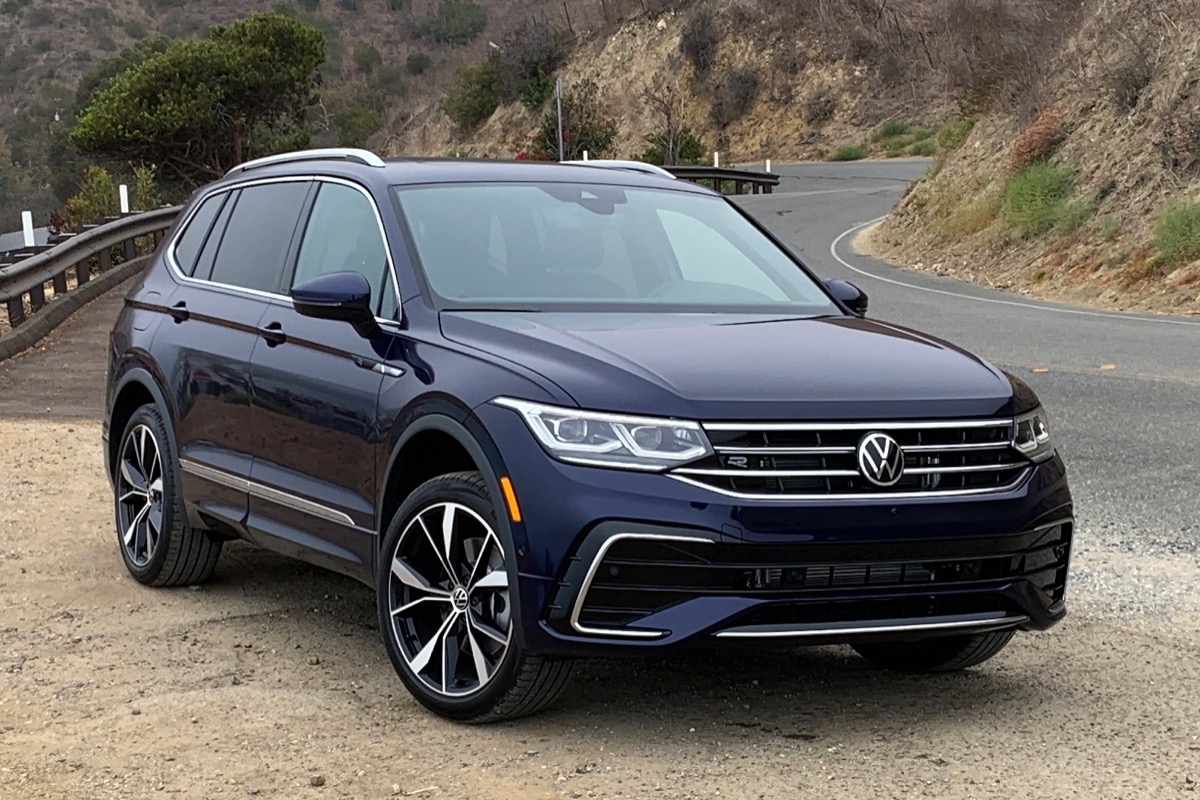
According to CarGurus experts, the overall rating for the 2022 Volkswagen Tiguan is 7.7 out of 10, while the 2021 Volkswagen ID.4 scores 7.3 out of 10. Based on these ratings, the 2022 Volkswagen Tiguan is the recommended choice, offering a more versatile and familiar driving experience with a higher overall rating.
Choose the 2022 Volkswagen Tiguan if:
- You need a spacious interior with a third-row seat option.
- You prefer a traditional gasoline engine with a familiar driving experience.
- You value a well-rounded infotainment system with multiple connectivity options.
Choose the 2021 Volkswagen ID.4 if:
- You want an all-electric vehicle with a distinctive design.
- You prioritize advanced driver assistance features and top safety ratings.
- You seek a comfortable ride with good forward visibility and a spacious cabin.
CarGurus highlights

According to CarGurus experts, the overall rating for the 2022 Volkswagen Tiguan is 7.7 out of 10, while the 2021 Volkswagen ID.4 scores 7.3 out of 10. Based on these ratings, the 2022 Volkswagen Tiguan is the recommended choice, offering a more versatile and familiar driving experience with a higher overall rating.
Choose the 2022 Volkswagen Tiguan if:
Shop Now- You need a spacious interior with a third-row seat option.
- You prefer a traditional gasoline engine with a familiar driving experience.
- You value a well-rounded infotainment system with multiple connectivity options.
Choose the 2021 Volkswagen ID.4 if:
Shop Now- You want an all-electric vehicle with a distinctive design.
- You prioritize advanced driver assistance features and top safety ratings.
- You seek a comfortable ride with good forward visibility and a spacious cabin.

By: CarGurus + AI
At CarGurus, our team of experienced automotive writers remain at the heart of our content operation, conducting hands-on car tests and writing insightful guides that are backed by years of industry experience. To complement this, we are harnessing AI to make our content offering more diverse and more helpful to shoppers than ever. To achieve this, our AI systems are based exclusively on CarGurus content, ratings and data, so that what we produce is both unique to CarGurus, and uniquely helpful to car shoppers.

